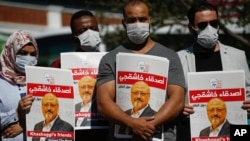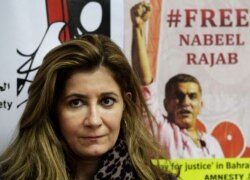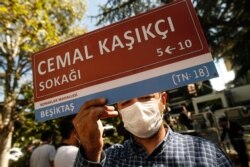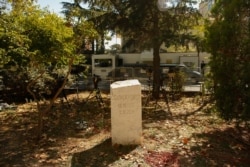“I can speak when so many cannot.” Jamal Khashoggi wrote these words in his first column for The Washington Post in September 2017. In it, the journalist described the situation in his home country, Saudi Arabia, as “unbearable” for those who dare to speak their mind.
Now, two years after his death at the Saudi Consulate in Istanbul, friends of Khashoggi have realized the journalist’s dream for a rights organization that holds Middle East governments to account and gives exiled journalists and activists a platform to speak openly about abuses.
Khashoggi came up with the idea for Democracy for the Arab World Now (DAWN) in June 2018, a few months before his death. At a press conference Tuesday, members of the group emphasized the need for human rights protections in the Middle East and North Africa, and laid out plans to track abuses in the region.
The organization will initially focus on governments that are allied to the United States — Saudi Arabia, Egypt and the United Arab Emirates — and will document how governments persecute dissenters and human rights advocates, DAWN’s executive director, Sarah Leah Whitson, said.
All three countries have poor records when it comes to supporting independent journalism, according to media watchdog Reporters Without Borders (RSF). On its press freedom index, RSF ranks Saudi Arabia at 170 out of 180, where 1 is the most free. Egypt comes in at 166, and the UAE at 131.
Saudi Arabia is “one of the world’s most prolific jailers” of journalists, RSF said Friday, as it called on members of the G-20 to hold Saudi Arabia to account for its rights abuses when the kingdom hosts a summit in November.
Platform for free speech
Whitson, who met Khashoggi while she was working as the Middle East director for Human Rights Watch, remembers the journalist as “a very gentle and soft-spoken man but very firm in his beliefs.”
In December 2016, Khashoggi told Whitson that Mohammed bin Salman, who was Saudi Arabia’s deputy crown prince at the time, had banned him from writing publicly. Seven months later, Khashoggi fled Saudi Arabia, leaving his grandchildren behind.
“It was their pictures he would show me on his phone. I can't emphasize enough how much pain he felt to have to leave his family,” Whitson told VOA. “This is a real human being, not just a political mind, but someone who had to make personal sacrifices for his principles.”
From exile, Khashoggi continued to criticize Saudi Arabia for its harassment and jailing of journalists and others who questioned the kingdom’s policies.
A CIA assessment of the journalist’s death and a report by the U.N. special rapporteur on extrajudicial killings concluded that high-level Saudi officials, including Salman were involved.
The Saudi Embassy in Washington, D.C., did not respond to VOA’s requests for comment about Khashoggi’s killing or its human rights record.
The crown prince has denied ordering Khashoggi’s killing but said in interviews with U.S. networks that he claims “full responsibility” as the kingdom’s unofficial leader. The country later prosecuted 11 unnamed people for the killing in a trial widely criticized as being a sham.
Governments in the Middle East and North Africa continue to stifle dissent. In the years since Khashoggi’s death, the crackdown on free speech in Saudi Arabia has persisted, Whitson said, and talking to foreign media and criticizing the kingdom continue to be a jailable offense.
“What [bin Salman’s] message is to the Saudi people is that there is no desire to hear their voices, their voices are not welcome, that they should shut up, that they have no say in his agenda for the country,” Whitson said.
To counter that silence, political exiles will be given a voice through DAWN’s platform, “Democracy in Exile,” that publishes articles and commentary on human rights abuses.
Fadoua Massat, an investigative journalist leading the platform, has met advocates and journalists who fled their homes to escape punishment, often without family members. Political exiles often face challenges upon arriving in a new country, Massat said. Some must leave their careers and instead find jobs like driving for the ride-sharing company Uber.
“Some of them face depression and some of them are living with survivor’s guilt because they feel they left other family members back home who are facing jail or harassment by their local governments,” Massat told VOA. “Some of them are excellent and brilliant journalists, but they are deprived of the right to write articles to express themselves freely.”
The platform will bring together these people, who will have the opportunity to write about the injustices in their homeland and around the world, Massat said.
Egyptian journalist Abdelrahman Youssef is one of the site’s contributors. Youssef covered the Arab Spring demonstrations in 2011 and the coup in Egypt in 2013. The next year, he left Egypt to the U.S. for a fellowship.
Friends who spoke freely about Egypt were detained when they tried to return home, and Youssef says he believes he would suffer a similar fate. But it is a difficult reality to grapple with, because his family still lives in Egypt.
Egypt has jailed large numbers of journalists, often on accusations of supporting the Muslim Brotherhood — the party of ousted leader Mohamed Morsi that Cairo has since designated a terrorist organization. Over 500 websites, including news outlets, have been blocked, and individuals risk arrest for social media posts, RSF reports.
Cairo, like other countries with repressive records, often cites national security threats from extremist groups or the need to protect social order as justification for its actions.
The Egyptian Embassy in Washington, D.C., did not respond to VOA’s request for comment.
“I try to find the hope to find a way to go back to my country, to my home,” Youssef told VOA. “I have many friends here, but at the end of the day, Egypt is my home, and all my family is there.”
Demand for action
Combating government crackdowns is crucial to DAWN’s mission, Whitson said, and it is dangerous for countries such as the U.S. to legitimize governments that punish dissent.
Stephen McInerney, executive director of the nonprofit Project on Middle East Democracy, told VOA it is important for groups to call out countries that the U.S. has positive relations with.
“The U.S. has a responsibility in those places. It has an opportunity through those relationships to try to pressure and use leverage to convince these governments to change their behavior on some of these issues,” McInerney said.
Egyptian journalist Youssef said that his contributions to Democracy in Exile will include calling out leaders of democracies who continue to show support for authoritarian governments.
“I think that foreign countries will pay a high cost for lack of democracy in the Arab world,” Youssef said. “I'm going to write about that to shed light on the bad truth of leaders in democratic countries who support dictatorships.”







